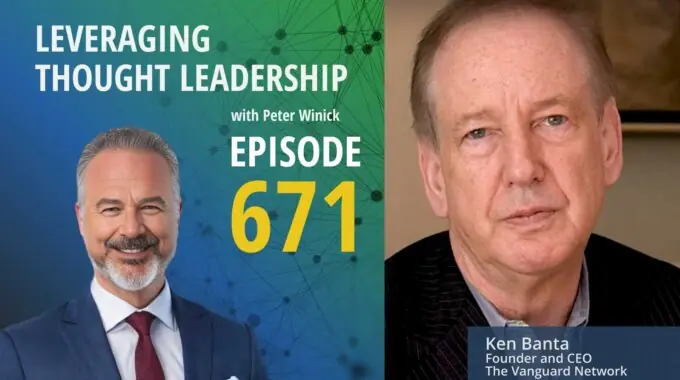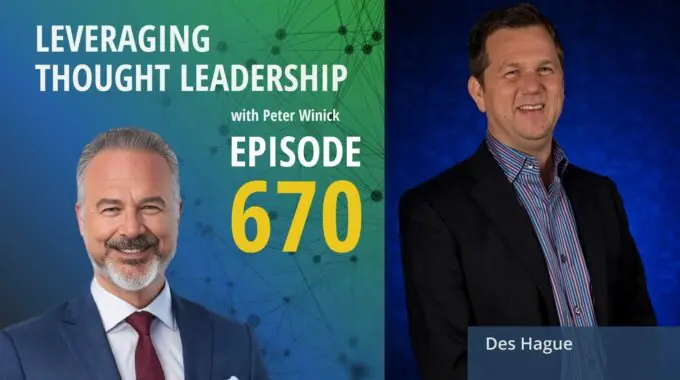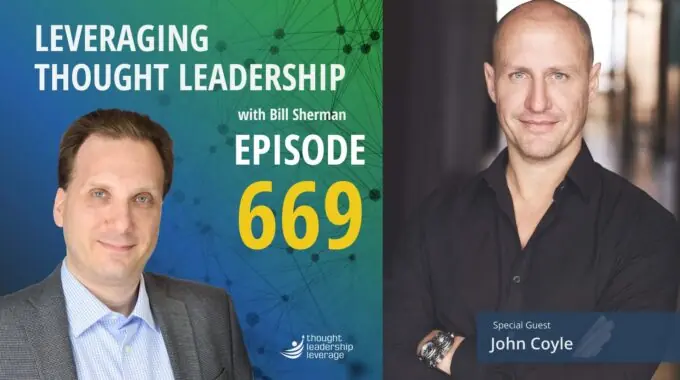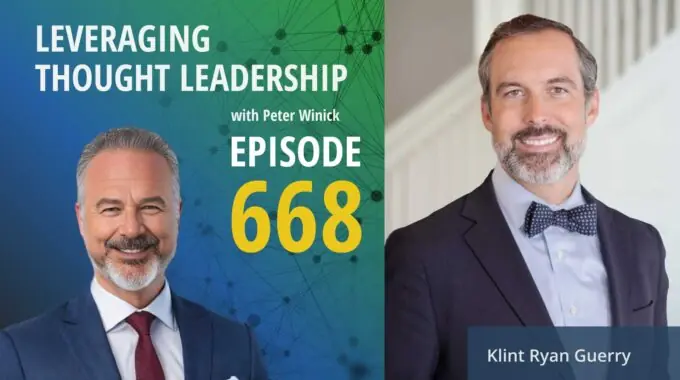Turning Conversations into Influence This episode highlights how peer-to-peer networks drive candid dialogue, spark fresh…
Becoming a Legendary Podcast Guest | Dana Lindahl
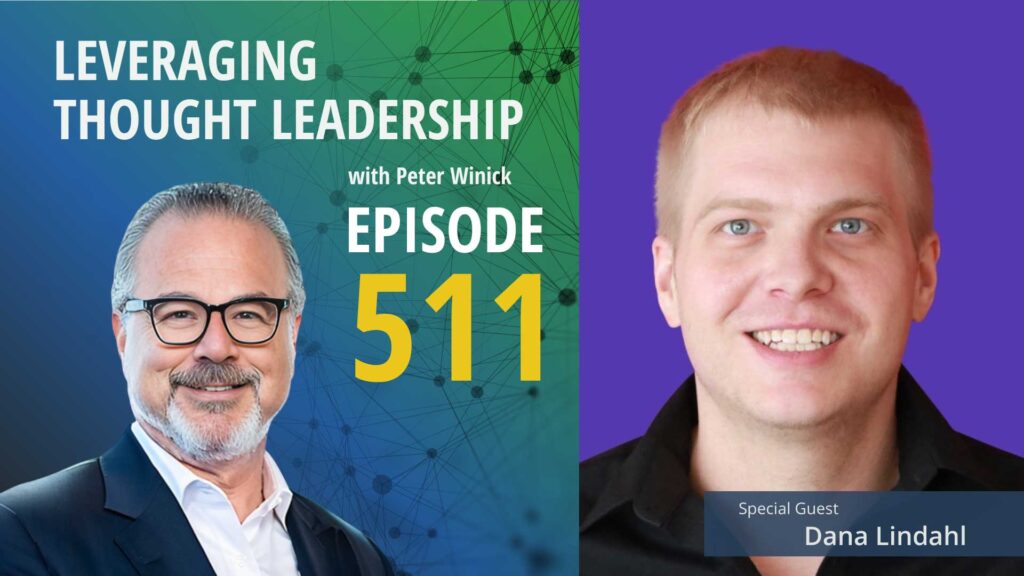
Best practices to keep in mind while being a podcast guest.
An interview with Dana Lindahl providing advice to get the most out of being a guest on podcasts.
You’ve been invited as a guest on a podcast! How exciting!
But… what now? What should you say, and how do you use this opportunity to shine a spotlight on your best ideas?
Our guest today is Dana Lindahl, the Founder and CEO of Legendary Podcasts, an agency that helps clients get booked on podcasts, so they can increase their visibility, brand, and legacy!
Being a guest on a podcast can be of tremendous benefit to your thought leadership. Dana explains how most clients are seeking to increase their exposure, create brand awareness, and generate leads. Many believe being on a podcast with a larger audience is the way to do this but Dana clarifies why a smaller audience is the one that needs to hear your message the most can have more impact.
Getting booked on a podcast often means doing a quick call beforehand to ensure what the guest has to offer fits the needs of the host’s show. We discover how a shockingly low number of potential guests have taken the time to listen to the show they are seeking to be on. Dana tells us why this is a critical mistake that can lead to the guest being passed over. The host/guest relationship needs to be a mutual one where the guest is providing valuable information to the host’s audience. If both ends are not getting something out of the interview it might not be the right fit.
Finally, Dana takes us beyond the podcast interview to the benefits that can blossom afterward. A guest appearance is more than a way to reach a larger audience it is a unique networking opportunity where the host and guest can find further ways to work together, share their network, and help each other. However, if only one side is doing the work the relationship will fail leading to missed opportunities.
If you are looking to be a guest on podcasts, you’ll want to check out this link where Dana has collected valuable information you can put to use in your quest to become a legendary guest!
Three Key Takeaways:
- A podcast that directly speaks to the audience you want to reach most is more powerful than a larger more general audience.
- When seeking to be a guest on a podcast research both the show and the host. Listen to the previous episode to identify how you can provide value to their audience.
- The value of a podcast doesn’t have to be one-and-done. The episode can be repurposed into blog posts, infographics, and sound bites continuing to provide content for weeks.
If you need a strategy to bring your thought leadership to market, Thought Leadership Leverage can assist you! Contact us for more information. In addition, we can help you implement marketing, research, and sales. Let us help you so you can devote yourself to what you do best.

Transcript
Peter Winick And welcome, welcome, welcome. This is Peter Winick. I’m the founder and CEO at Thought Leadership Leverage and you are joining us on the podcast today, which is leveraging thought leadership today. My guest is Data, Lyndall and Dana is the founder and CEO of Legendary Podcast, which is a podcast agency and he is also an author of a book called LinkedIn’s Sales Success, as well as a founder of a couple of other entities over the years. But today we’re gonna talk a lot about podcasting. So, so welcome aboard, Dana. How are you?
Dana Lindahl I’m great, Peter. Thanks for having me. Really excited to be here.
Peter Winick So I’m excited about today’s conversation because just recently we published our 500th episode and I’ve learned a lot along the way as a host. And what I was hoping today is sort of look at this from a little bit more from the guest perspective and how guests can maximize the benefit they get because frankly, I get somewhere between disappointed and frustrated sometimes when we don’t get some of the other things we’re looking for from a guest. So to me, I always think about, well, why does somebody want to be on a guest on a podcast? And let me just let me sort of throw that to you. What are the benefits of someone guesting on someone else’s podcast?
Dana Lindahl So most people that are going to go and guest on someone’s podcast are, at the end of the day doing it for some form of exposure, brand awareness, lead generation, or just getting their name out there in front of a target audience. The challenge becomes how do they mix that in with something that is aligned with what the host wants as well? Because generally the host in their audience is less concerned with Can this guest generate leads from there? Is this desk going to get more exposure? So we need to make sure that we’re aligning the two incentives on both sides.
Peter Winick Yeah, So I think that’s right. So I think that it’s never a direct hey, call me to, you know, to solve this problem for you. It doesn’t need to be that blunt. It shouldn’t be that blunt. But I think if you go back to sort of what you said, the audience that a podcaster has developed over the years, that’s really a huge value prop. And I think one of the things that guys should be looking at is, okay, great, it’s flattering early on to be accepted as a guest at almost any podcast, but the reality is if the composition, the demographics, the psychographics of that audience don’t line up with the types of folks you want to get in front of, it’s probably not a good use of your time.
Dana Lindahl Yeah. One of the things that we try to impress upon our clients very frequently is that we’d rather have them go on a show and speak to a smaller number of people who are exactly the right type of people that they want to be speaking to, rather than going on a huge show that’s full of people from all over the place, interested in all sorts of things and very general because we want them to be able to have a conversation that speaks directly in to the ears of the people that need to hear it most rather than just speaking out into the void.
Peter Winick And the more niche a podcast, by definition, you’re going to have smaller topline numbers, which isn’t really the point. Whether, you know, you really shouldn’t judge a podcast on whether it has 100,000 downloads a month or a thousand. I think the better question is, are those the right thousand for me? Mm hmm. Right. So let me sort of go in a little bit of a different direction. So I’ll give you my experience and I’d love to hear your feedback that you might give a potential guest or a client. So people get pitched up all the time. Either they pitch directly or through an agency. We have a process where we do a screening call if we think they might be a guest. And the screening call is really to make sure there’s alignment and that the guest understands sort of what our format is, what they get, you know, get them comfortable with who we are, what we’re doing and where the conversation is going to go, format, etc., etc.. I would say I do about ten of those calls a week to pick one or two guests a week because we’re we don’t want to have anybody on. I would say that 95% of the folks that I ask them during that pre call, hey, have you checked out our site or listen to any episodes? And I’m shocked that north of 90% say, oh no, I haven’t done that yet. And I find that really, really, really disturbing. Could you comment on that?
Dana Lindahl Well, I think that yet part is really funny because if you haven’t done it before recording this pre-interview, when are you going to actually do it? Yeah.
Peter Winick That’s like going on the job interview. And they ask you, Have you researched the company? No. After you hired me, I was going to think about it. Yeah.
Dana Lindahl Exactly. I think that this is one of the biggest ways to have success within podcasting because everyone wants to get their message out there to an audience. But the way that you do this is not by trying to pitch yourself, not talking too much about your company, but by saying the types of things that actually provide value to that audience. So if you haven’t seen how the host interacts with his guests in the past, if you haven’t looked at some of the reviews and see what are the parts of the podcast that people are finding valuable, you actually have no idea how to speak to that audience. So you go in talking tone deaf, you shouldn’t be pitching yourself on a show. You shouldn’t be talking too much about your company. You should be talking about something that provides value. But if you don’t know what’s a value to those people, you’re not going to be providing value and a lot of people will fall back to, Well, here’s what we do, here’s what we’re good at, and that just turns people away. People don’t up.
Peter Winick And I’m you know, I’m not suggesting someone say, oh, my God, you know, before this quick 20 minute call today, I listen to ten episodes. But, you know, in a you know, hey, I skimmed a few episodes. I listened to a bit of a few, and here’s the things that I took away from it. Is that in line with what you’re thinking or there is a guest on your you know, you could look for a guest that you have resonance with and listen to that one, etc.. But to just say not yet, I think is not is showing that there’s just a lack of preparedness. That’s number one. Number two, we record the episode. That’s actually the easy part, right? Having an engaging conversation for 20 minutes, I think that’s usually fairly easy to do. And I’ve only had one or two instances over hundreds where someone went a little pitchy, you know, And I’m like, Whoa, whoa, you had this is not an infomercial. Like, we’re not going to go there. That’s unusual. The second disappointing phase and this isn’t meant as complaint, but it has to have an educational conversation as once we publish an episode and there’s usually a lag of 4 to 8 weeks, depending on our cue, and we let people know that we will provide them with a whole bunch of assets. Right. Here’s a way to share this on LinkedIn, on Twitter, on the usual pieces. You know, please help us promote it. And I would say we’re lucky to get maybe 40 to 50% do something. And I think just as an etiquette of being a good guest is to show that you’re being helpful as well, because I want my guests to promote to their audience, which is different than my followership. Tony, any thoughts on that?
Dana Lindahl Yeah, we always push our customers to be doing this because it amplifies the appearance that you’ve already done. Why spend all this time scheduling with the host, spending time to record, to only just let one side promote that? I think what ends up happening with a lot of people and I don’t think this is what happens with your show because I’ve had pretty good communication throughout. But some shows don’t actually send these things to the guest in advance. So they’re just kind of blindsided. They wake up on a Tuesday and it’s like someone’s tagged them on LinkedIn and they go, Oh, I just want have time to get a post out today. I didn’t know it was coming, you know, but I don’t think that’s what’s happening with you guys. Another thing that I see that happens somewhat commonly. Is that people are using podcasting to build their audience and their following so they don’t have that following going into it. So they sometimes feel like it’s better to just. Well, I’m going on this show. I’ll let them promote me. And I’m not saying that this is the right way to do it. I think that even.
Peter Winick So, I understand the logic there. But I’ve got to tell you that even if somebody had a very, very small following on LinkedIn or wherever, hundreds thousand, something like that, I think it’s just more of a respecting to show that, listen, I might have a smaller audience and a smaller reach and just whatever, but I’m willing to put your thinking in front of my people as I hope you’d put my thinking in front of your people. And I don’t look and say, Oh, well, their audience is so tiny. I don’t really care typically about a guest’s audience or reach. I care about having a good conversation. That’s a value to the audience. And many times they do. They might have one exponentially bigger than mine. That’s cool too, but that’s not really a select criteria.
Dana Lindahl Yeah, I agree 100%. I was actually surprised by the answer that I just gave because we received this back from a few handful of our clients in the past where we send along materials to them and we said, Hey, you haven’t posted this yet unless, you know, we really don’t have a big enough following. We’re just not going to post it. And every single time we came in and were like, Hey, the host that you just had a call with that is a really good person that you should be building a network with, building a relationship with. If you win on their show, it means that you have overlap in each other’s industries. So why would you not reciprocate with posting that, even if it doesn’t result in a lot of views, even if it doesn’t result in a lot of impact for the host? He or she had you on their show. They were nice enough to accommodate for you. They didn’t have to. They’re promoting you. It’s just the right thing to do to promote them.
Peter Winick If you’re enjoying this episode of Leveraging Thought Leadership, please make sure to subscribe. If you’d like to help spread the word about our podcast, please leave a five-star review at ratethispodcast.com/ltl and share it with your friends. We’re available on Apple Podcasts and on all major listening apps as well as that thoughtleadershipleverage.com/podcast.
Well you mentioned – you mentioned a key piece here that we haven’t touched on yet and that is maybe it’s a secondary benefit, maybe for some it’s a primary benefit. I have made some amazingly wonderful, awesome relationships from people that have become friends to people that have become clients or I’ve become clients of theirs, whatever. Developing this, this relationship through a podcast experience is really, really fun. It’s a it’s amazing, you know, And I think a lot of folks don’t realize that that’s a benefit that happens. Hey, how did we meet? Oh, yeah, I was a guest on a show or, you know, you know, we did a call to be on their show and now wasn’t the time, but we developed a rapport and it was more appropriate for us to do that episode a year later. I think that’s a big piece that people forget about. Is that relationship building piece.
Dana Lindahl For sure, For sure. We’ve had customers make quite a bit of money from simply realizing organically after having done a show together that like, Hey, wait, why are we not doing that? Doing something together? Yeah, like it doesn’t necessarily have legs and they don’t have the idea fleshed out right after the episode, but they talk to each other. They realize that they are on the same page with things that are in a similar industry but not competitive. And then we’ve had a number of people do joint venture deals.
Peter Winick And yeah, you mentioned earlier on you realize like, listen, this isn’t some random stranger you sit next to on an airplane. There’s some commonality, a subject matter, a focus area. You have something in common. You’ve had an experience together, and I think that’s great. Other thought I want to throw at you, I’ve got a bunch of so much here to talk about is that I think one of the values of podcast and I don’t know that everybody really thinks this way is that you’ve now created an asset, right? So you did the podcast, you did the work, you spent your 20, 30 minutes getting on the show. You’ve got an asset and the value of that asset is not one and done. Oh yeah, that got published in October or whatever it was you should be and can be reusing that asset. Either you can repurpose the conversation and get transcripts made, turn it into blogs or infomercials or internet infomercial infographics, whatever the case may be, or repost it every couple of months just because a podcast, you know, podcast, most conversations lean towards the more evergreen then we’re talking about, you know, something in the news cycle. And I don’t think a lot of guests sort of repurpose some of the episodes they’ve been on and they don’t sort of categorize that, right? If you’ve been on 100 episodes, you should categorize different themes and figure out how to integrate that into your sales and marketing process to say, Hey, hey, Mr. Potential Client or Ms. Potential client. You came to me to talk about this problem. Here’s three episodes of three different podcast I was on talking about the same thing. Give a listen. And any reactions to that?
Dana Lindahl Yeah, no, I’m a big fan of repurposing content. I find it works. Really. Well in the sales process as well, particularly if you’re doing sales yourself or even if you have sales people selling for you, because oftentimes you’ll have people following up with you and asking questions about, you know, various elements of your service offering or whatever it is that you’re selling. And I find it’s a huge authority booster to be able to say, you know, respond back with a quick answer to the question and then link it. I actually went away or into detail on this podcast right here. You can find it at this timestamp, right? Because now not only are you answering their question, but you’re linking them to a resource where you’re being interviewed by an expert about the question that they have.
Peter Winick Yep. And then, you know, some other things that I think would might be valuable or helpful to folks is if you’ve been you know, you’re a guest on a podcast and you’re talking to a host, you might, you know, well, you know, I was just a guest last, you know, two weeks ago on this other one. It seems like you and that host might have something in common. Might I broker an introduction? Right. Or I’ll say to folks sometimes, Hey, you know what? If you look through my guest, many of them have podcast on their own. If you’d like, I’d be happy to make an introduction because I think they’re a good guest and I think it’s a mutually beneficial thing for me to reach out to, to a friend or a colleague and say, Hey, I just had Dana on my podcast. He was a really super guest and we had a great conversation. I think you’d be a great guest on yours as well.
Dana Lindahl Yeah, most podcasters are very, very open to the sort of podcast swapping. It’s one of the ways that they grow their shows as well. And it’s all a networking thing as well. So podcasters don’t bother podcasters and it’s a great way to get a foot in the door to do a couple of shows and start asking these other host, Hey, who else do you might know that I should be in touch with? Who else are you looking to be in touch with? That I can introduce you to.
Peter Winick So I just want to push on the swapping because I think there’s two ways that that comes to life. One is organically. Naturally. Hey, Dana, I think you’re good guest. You know, when I was on this thing two weeks ago, I’m just going to make an introduction. There’s no expectation. There’s no quid pro quo. I get solicited often. Hey, Peter, let’s do a, you know, a podcast swap. I’ll be on yours if you’ll be on mine. Wink, wink. And I just don’t like the keeping score of that. Like where I won’t do this for you unless you agree to do this for me. Because I don’t know. I don’t know if I want to have you as a guest. I might be a great guest for you. You might be an awful guest for me and vice versa. Let’s not let’s not force it to any thoughts. And why am I being picky either? No, I.
Dana Lindahl Think it’s very valid. I think the swap works better when it doesn’t start off as a swap, but it starts off as a singular appearance. It is a great conversation. And then they both realize like, Hey, I’ve got a podcast too. Why don’t you come on mine? We can approach this same conversation from a slightly different direction on my show because my audience talks about two things.
Peter Winick Yeah, exactly. Exactly. Any other thoughts or things that you have recommendations for? Guest in terms of what to do and what not to do?
Dana Lindahl Yeah. Besides the make sure you do a little bit of research on the show and make sure you don’t pitch yourself. There is generally one opportunity in every podcast where you do get an opportunity to be a little bit promotional, and that’s when the host is asking How can people get in touch with you? And I find that most people waste this opportunity by simply giving a link to their homepage or giving a link to their LinkedIn, you know, requiring the audience to take that next step, to reach out, send a connection, request, something that introverted person is never going to do on their own. What I find better is to for every appearance that you do have a special link where you can send people to not your homepage, where they can find more valuable materials from you to build upon what you’ve talked about on the episode that you just did. So it’s a great way to let people know.
Peter Winick I’m going to I’m going to have you eat your own dog food. So, Dana, how do people get So I love that idea because oftentimes they’ll say, oh, it’ll be you know, it’ll be in the show notes. I’ll put a link to how to get in touch with Dana in the show notes, whatever, whatever. But the reality is the use case of a podcast is I’m in my car, I’m in the gym, I’m taking a walk, whatever. I don’t have that right. I’m not going to go back and look at the show notes. Right? So once you model this for us, how would folks get in touch with you if they want to get in touch with one of the best podcast booking agencies out there?
Dana Lindahl Yeah. So if you head over to legendary podcast dot.com slash guest, you can find a whole lot of gas resources for how to appear, how to find the best shows and what to talk about while you’re on there to further your business goals. You can find some content there that’s on it. Some of it is behind and opt in. Some of the best practices that I’ve just used in giving this link is one I’ve made sure that it’s very, very simple to remember by memory. No one needs to write it down. It’s just my website slash single word. You have to.
Peter Winick I love what you did there because obviously it’s implied that if they’re in the market for an agency, you’d be glad to help them. Clearly, we know that. But you’re leading with generosity. You’re leading with a gift, you’re leading with insight and saying, hey, go check this out. Right? Like, go take a look at this. Here’s some of my best thinking, which is a great example of a use case of thought leadership to drive a business. Now, not everyone that’s going to go there is a. Obviously going to bring you on to hire you. But I think if they’re looking to a move into that space or look at an agency, you’ve automatically differentiated yourself because it’s not salesy. It’s beneficial to me at a moment in time where I’m thinking about potentially doing it. So that I think that’s awesome. So I want to thank you for Your Times has been fantastic. I’ve loved the interactions you and I and our respective organizations have had over the last couple months, sharing ideas and sharing guests and all that. And I appreciate lots of wisdom today. Thank you so much, Dana.
Dana Lindahl Thanks so much for having me.
Peter Winick To learn more about thought leadership leverage, please visit our Web site at Thought Leadership Leverage dot com to reach me directly. Feel free to email me at Peter at thoughtleadershipleverage.com and please subscribe to Leveraging Thought Leadership on iTunes or your favorite podcast app to get your weekly episode automatically.


